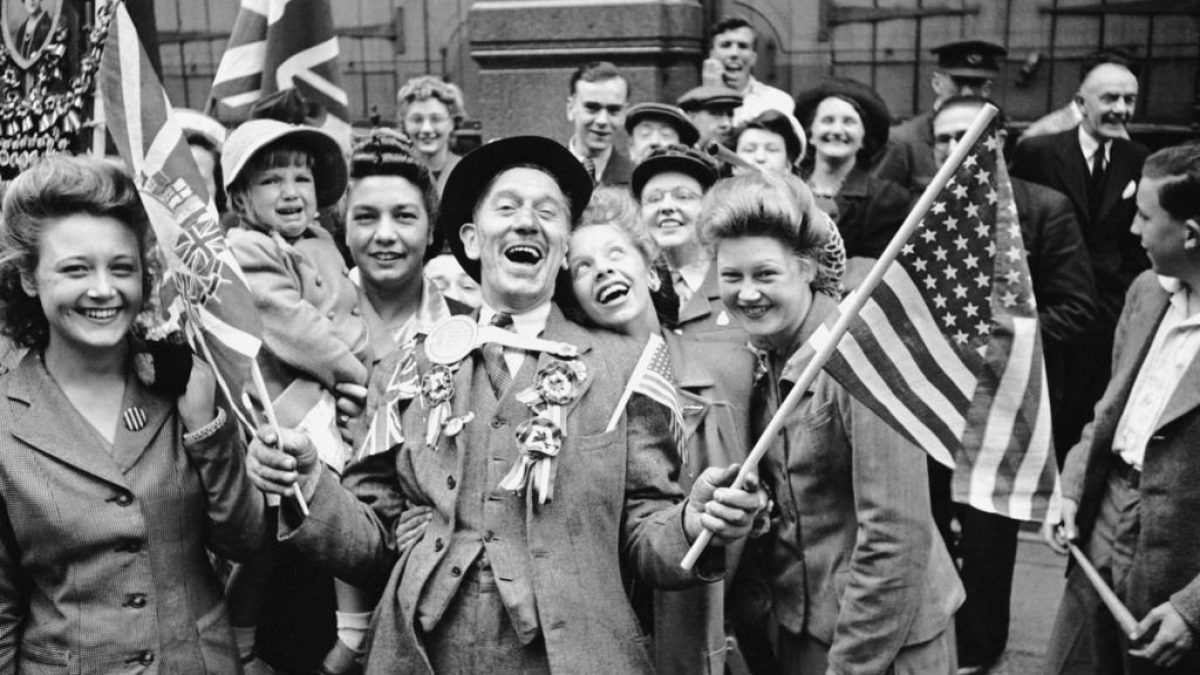The declaration of victory over Hitler brought rare and unrestrained joy for Britons. But as Europe once more searches for peace 80 years later, the celebrations of 8 May 1945 serve as a reminder of the vast costs of that all-consuming war
At 7.40pm on Monday 7 May 1945, millions of Britons tuned into the BBC had their listening abruptly interrupted. For many, the news flash delivered in clipped tones by a male announcer was not a surprise. Instead, it lifted the curtain on a moment of profound joy and longing: the end of the Second World War in Europe.
Some 11 months earlier, it had been the voice of the same broadcaster – John Snagge, the Oxford-educated son of a senior judge – which had announced to the nation that the D-Day landings had begun. This time, in a bulletin which had been agreed with the Ministry of Information, he told listeners to expect an “official announcement” at 3pm the following day, adding: “In view of this fact, tomorrow, Tuesday, will be treated as Victory in Europe day and will be regarded as a holiday.”
Some 80 years later, VE Day continues to conjure vivid images of exuberant, if war-weary Britons letting their hair down amid an outpouring of conga-dancing patriotism and tea party-focused gratitude that, finally, the toil and bloodletting of war against the Nazis was over. As Winston Churchill put it in a speech delivered to the nation at 3pm on 8 May: “We may allow ourselves a brief period of rejoicing.”
But what has perhaps been forgotten in the intervening decades is the sheer range and complexity of emotions – including simmering political resentments and abiding fear over a war that was at that stage still only half won as bitter fighting with Japan continued – that accompanied the smiles and singing of 8 May 1945.
The arrival of VE Day had been anticipated for several days, if not weeks. Hitler’s suicide on 30 April had been followed by a series of rolling ceasefires and surrenders in Germany, culminating in a final Nazi capitulation in the early hours of 7 May as General Alfred Jodl, the leader of what remained of the German army, signed the instrument of surrender in a school at General Eisenhower’s headquarters in the French city of Reims. It decreed that as of 12.01am on 8 May, all fighting in Europe would end.
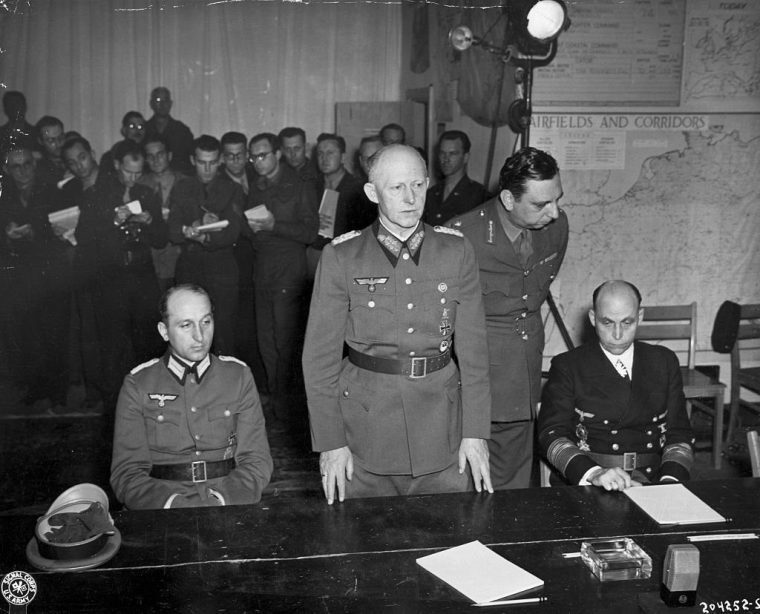 Nazi general Gustaf Jodl stands at table in war room of Allied headquarters in a school room at Rheims ready to sign unconditional surrender terms. (Photo: Bettmann Archive)
Nazi general Gustaf Jodl stands at table in war room of Allied headquarters in a school room at Rheims ready to sign unconditional surrender terms. (Photo: Bettmann Archive)
But for all that its dawning had been drawn out, the “cessation of active operations” – the dry military term used by the generals in Reims to describe the end of five years of calamitous war in Europe which had claimed 15 to 20 million lives, among them the six million Jews whose murder in the Holocaust was only just beginning to be revealed in grainy newsreel footage – was greeted with a rare and unrestrained fervour in a nation exhausted by conflict. For 24 hours at least Britain let rip, giddied by the sensation of victory in a confrontation freighted with the knowledge that the very existence of a democratic and free country had been at stake.
This was above all a moment of all-encompassing celebration for civilians and those in uniform, people in Britain and those under arms in a country clinging – just about credibly – to the vestiges of its “great power” status. After privations and ordeals ranging from rationing to the terror of the Blitz and the V1 and V2 rocket campaigns, not mention to the worry and loss of loved ones fighting at home and abroad, here was a United Kingdom which needed little or no encouragement for a knees-up.
Winston Churchill, who would address the nation at 3pm to formally announce the defeat of Nazism, had contacted the Ministry of Food in the closing days of the war to check there were sufficient supplies of beer in London for VE Day. Similarly, the Board of Trade let it be known that red, white and blue bunting needed to bedeck the nation could be purchased without the need for rationing coupons.
The result was the day of exhilarated, good-humoured tumult caught in images passed down the generations: vast crowds gathered outside Buckingham Palace; Land Girls and Royal Navy ratings dancing in the fountains of Trafalgar Square; crowds dancing; and children clad in tin-foil crowns eating cakes and treats magicked from meagre rations.
James Taylor, principal curator of public history at the Imperial War Museum, said: “The sense of release on VE Day is simply immense. There had been frustration at how long it was taking for victory to be announced but when it finally came, the joy wasvery real. People can start to plan for a new existence, which is peacetime, and this is what you see played out on the streets. There is huge relief.
“The sense of threat which people had lived under for so long – the last V2 rocket attack had only been six weeks previously – had suddenly gone. We have to remember that this was for Britain, albeit three or four years previously, a war of survival.
“And at the same time, people are also realising exactly what sort of enemy they had been fighting. The footage of the liberation of Bergen-Belsen concentration camp had only started to play in cinemas in previous days. So there are all sorts of emotions which are finding expression on this day.”
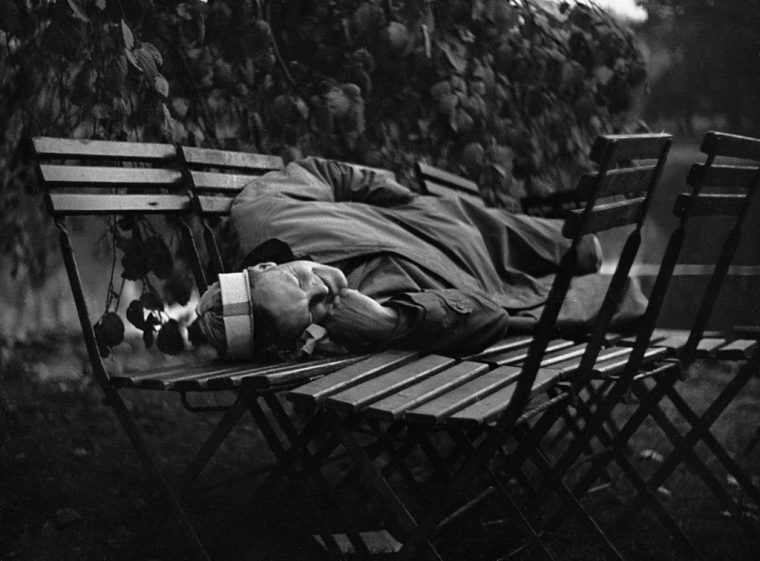 Alongside the celebrations, Britain had been exhausted by the travails of a war which, although finished in Europe, continued in Germany (Photo: Hulton-Deutsch Collection/CORBIS/Corbis/Getty)
Alongside the celebrations, Britain had been exhausted by the travails of a war which, although finished in Europe, continued in Germany (Photo: Hulton-Deutsch Collection/CORBIS/Corbis/Getty)
Indeed, while VE Day was a moment for ordinary Britons to participate in a moment of national and communal festivity, it was also a moment in which raw reflections, hardships and yearnings were shared within households and between couples separated by warfare.
Some 170 miles from The Mall and Whitehall, where the crowds had started to gather almost from the moment of the BBC broadcast on the evening of 7 May, Olga Mowforth, a Sheffield housewife wrote that day to her husband Cyril.
The couple had been married for just three months when the outbreak of war separated them and he joined the 42nd Royal Tank Regiment – subsequently fighting his way across North Africa and Europe, before eventually helping to liberate Bergen-Belsen in April 1945 when British troops found 60,000 survivors, nearly half of whom had been so cruelly starved by the SS that their bodies could not survive freedom. Some 28,000 died within weeks.
Olga, then 27, who had worked as a wartime ambulance driver, told Cyril: “Naturally there is an air of excitement everywhere. We feel empty but we don’t want to eat. They announced Germany’s unconditional surrender, after all these years, it all just seems hard to believe. I wish I knew what you were doing darling, wish I could talk to you for just five minutes.”
She added: “I went to the flicks on Thursday, chiefly to see the pictures taken at Belsen and Buchenwald. They were gruesome and it must have been terrible to have seen the things first hand as you did.”
The letters, part of a project – Letters to Loved Ones – by the Imperial War Museum to gather testimonies of the war in the form of family correspondence, pay witness to some of the social shifts caused by the war, with Olga telling her husband that she had little interest in continuing to work once he returned.
She wrote: “Actually I don’t mind continuing work until you do come home… but I feel that we have both had enough of this jumbled sort of living and I have no intention of asking you to share the housework so that I can go out to work, no, thank you.”
Some 600 miles away, Cyril, then 31, experienced VE Day in a manner similar to many of the British troops abroad – some five million of whom were deployed to Europe during the war along with 1.3 million from the British Empire and Commonwealth nations.
Writing to Olga from his tank squadron’s position after crossing the River Elbe in Germany, he wrote: “Everybody went mad, cheering, shouting, firing our guns in the air. As it happened, we’d a good drop of wine in the squadron and by 10 o’clock there was only about half a dozen of us still sober. I turned in and had my first night’s sleep since we crossed the Elbe last week.”
He added: “Today life goes on as usual except that there’s no more ‘push on’ business – no more leading tank – no more sudden death…. I still can’t get used to the feeling of no longer living on the edge of eternity.”
This nascent sense of the promise of a return to “normality” and custom – a feeling which war had replaced with permanent and threatening upheaval – permeated the celebrations.
In London, the focus of the crowds as they poured into pubs, climbed lampposts and piggybacked on any available form of transport, was the bulwarks of the British state in the form of Whitehall and Buckingham Palace.
In St Paul’s Cathedral, such was demand for literal thanks to God that ten consecutive services were held, each filling the vast church.
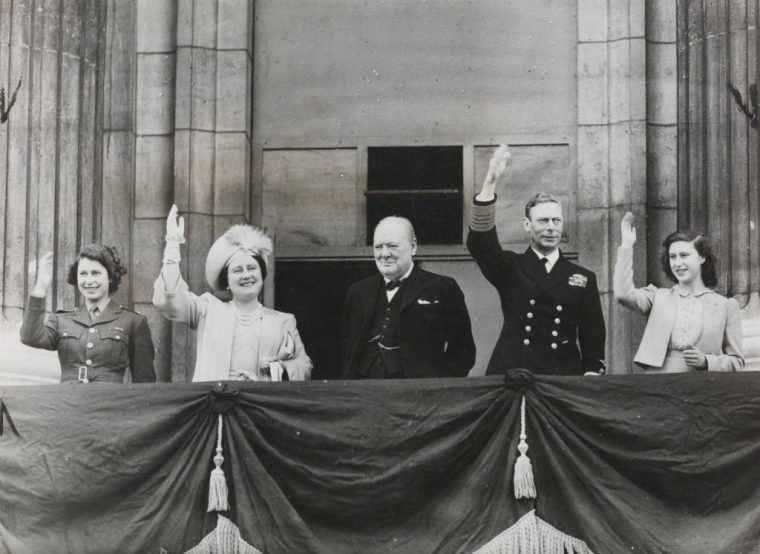 The Royal Family and Winston Churchill greet the people from Buckingham Palace balcony on 8 May 1945 (Photo by Daily Herald Archive/National Science & Media Museum/SSPL via Getty Images)
The Royal Family and Winston Churchill greet the people from Buckingham Palace balcony on 8 May 1945 (Photo by Daily Herald Archive/National Science & Media Museum/SSPL via Getty Images)
After a rainy start to VE Day, revellers increasingly gathered on The Mall calling for King George and the Royal Family to make what became no fewer than eight appearances – one including Churchill – on the Palace balcony.
The centrality of the Windsors gave rise to perhaps the most enduring example of the suspension of convention that day when then 19-year-old Princess Elizabeth, the future Queen, persuaded her parents to allow her and her sister, Princess Margaret, to join the crowds in central London, albeit accompanied by a phalanx of 16 trusted Palace personnel to maintain royal probity.
After witnessing crowds of strangers linking arms on Whitehall, the royal party danced a conga through the Ritz Hotel – raising eyebrows among the gathered grande dames of British society – before returning to the Palace via the Royal Parks. Jean Woodroffe, one of the future Queen’s ladies-in-waiting, recalled: “There were places like Green Park and St James’s which one would never have walked through at night in the war, and there we were. There was the usual thing of people kissing and hugging – and even making love. I was shocked by it – I hadn’t experienced that sort of thing happening before in public.”
Certainly it was a night of freedom which left a lasting impression on the Sovereign. She later said: “I think it was one of the most memorable nights of my life.”
But beyond the release of VE Day, other deeper currents were flowing through the nation and British society for which the celebrations were but a brief interlude.
Even as Churchill, whose attempt to tell crowds on Whitehall that the day represented their victory was met with shouts of “No, it’s yours”, invoked his “brief period of rejoicing”, he added: “But let us not forget for a moment the toil and efforts that lie ahead.”
The war had claimed the lives of 384,000 British military personnel and some 67,000 civilians. But with the war continuing in Japan, few needed reminding that yet more sacrifice could well await. Any military personnel dancing a joyous jitterbug on VE Day knew that before long they could find themselves headed to the vicious war in the Pacific. The world-changing secret of the Manhattan Project and the atom bomb was known to virtually no-one celebrating on 8 May 1945.
Mr Taylor said: “For anyone in uniform that night the celebration may well have been a bit muted because for all the smiling and waving of flags, they will have had in the back of their minds the question of whether they would have to take part in an invasion of Japan. That was a very present fear.”
But also in people’s minds were an array of tensions and expectations – both exposed by the war and then endured by the necessities of the conflict – that many felt needed to be addressed by such a hard-won peace.
From the position of women in society to the racial iniquities exposed by the arrival in Britain of Commonwealth and Black American troops, and the social inequalities blown open by the Blitz, the democratic rebellion that would see Churchill removed from Downing Street just eight weeks later in a Labour landslide was already beginning to bubble on VE Day.
Although the idea that the Second World War in and of itself turned Britain socialist is wide of the mark, it certainly persuaded Britons of the power of the state and the necessity of a post-war contract with the citizens of whom it had asked so much.
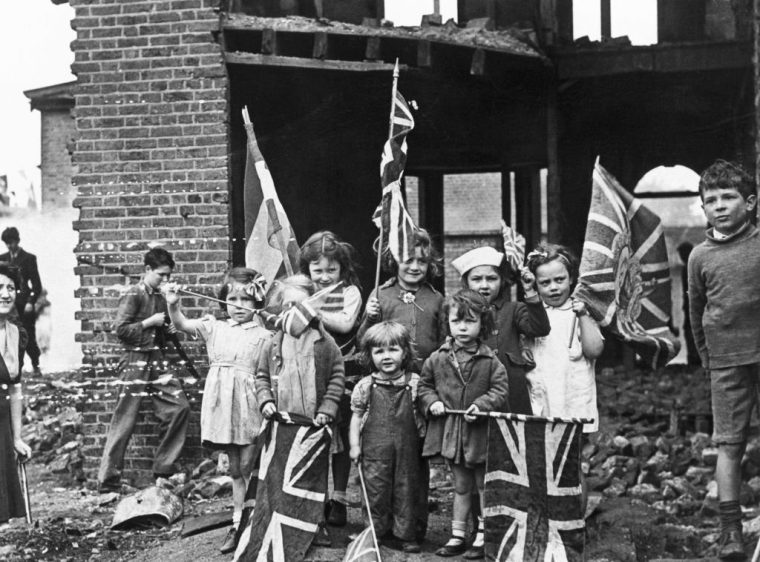 Children waving flags on VE Day in bomb-scarred Battersea, south London. The Blitz took a heavy toll on working class areas of Britain’s cities. (Photo by Daily Herald Archive/National Science & Media Museum/SSPL via Getty Images)
Children waving flags on VE Day in bomb-scarred Battersea, south London. The Blitz took a heavy toll on working class areas of Britain’s cities. (Photo by Daily Herald Archive/National Science & Media Museum/SSPL via Getty Images)
In 1942, the economist William Beveridge had published his landmark report setting out the basis for the welfare state, including the foundation of the National Health Service. It was a potent promise of change which propelled Labour’s Clement Attlee to power on 5 July 1945, sweeping aside Churchill – the man who had earned the nation’s eternal gratitude but not its confidence that he could shape its future.
Professor Wendy Ugolini, a cultural military historian of the Second World War at the University of Edinburgh, argues that there is a danger of homogenising the experience of wartime Britons through the prism of events like VE Day, when in reality the conflict and its dolorous losses imposed huge stresses and strains on society.
She said: “As much as we talk about the equality of sacrifice in the Second World War, there was in fact an unevenness to the way it was experienced. The Blitz by and large destroyed working class areas such as dockyards. There was a sense at the time of class distinctions and that the privileged were getting better services, such as access to shelters, or could afford to go restaurants or have different food, and so on.
“The risk is that when the sacrifice of the war is commemorated through VE Day we also end up with quite a sanitised or rehearsed narrative. We have barely scratched the surface of our understanding of the lived experience of the war across the UK.”
With war between nations once more blighting Europe amid an uncertain search for peace, it is surely also the case that even now the lessons, as well as the experiences, of the Second World War are still being learned.
After celebrating on the streets of Sheffield, witnessing bonfires and fireworks stashed from before the war, Olga Mowforth wrote to Cyril late on VE Day as she sought sum up the sweet moment of pause in their soon-to-end separation. The couple were reunited and went on to enjoy a happy marriage, although it was not until Cyril’s death in 2004 and the age of 91 their wartime letters – some 1,000 in total – were discovered by relatives.
Some 80 years after VE Day, Olga’s words echo down the ages.
She wrote: “Well ducks, today is a happy day, we shall celebrate and then we shall start work again… We must work to win the peace and then perhaps this beastly thing called war will not shadow our lives again.”
